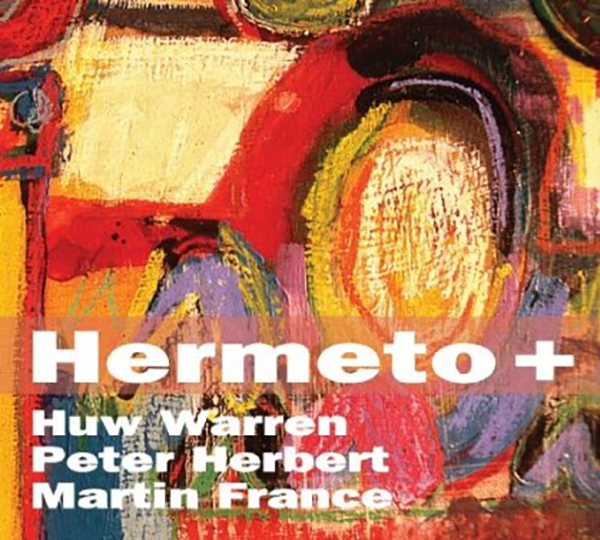
by Ian Mann
November 01, 2009
/ ALBUM
A consistently engaging album that combines playfulness, beauty and experimentation in a manner true to the spirit of it's inspiration Hermeto Pascoal
The Welsh pianist and composer Huw Warren has always exhibited a quirky streak in his work as evidenced both by his work with the group Perfect Houseplants and on solo recordings such as “A Barrel Organ Far From Home” and “Hundreds Of Things A Boy Can Make”. Perhaps then, it shouldn’t come as a total surprise that Warren has loved the music of that great musical maverick Hermeto Pascoal for the past twenty five years and that Pascoal should have been a major influence on Warren’s own work.
“Hermeto +” is Warren’s tribute to the great Brazilian musician and composer and features a number of Pascoal’s compositions. However this is more than just a mere “tribute record”, the compositions are split pretty much equally between Pascoal and Warren himself with Warren and his trio casting fresh light on Hermeto’s tunes. Warren’s liner notes express his wish that this recording should be a “celebration, tribute and a musical thank you”. On the evidence of the music to be heard here he has succeeded brilliantly and “Hermeto +” is a fine record in it’s own right.
Warren’s companions here are two long term associates. Austrian bassist Peter Herbert has appeared on a number of Warren’s solo projects and drummer Martin France was also a member of Perfect Houseplants. France first came to prominence as a member of the seminal 80’s big band Loose Tubes who also cited Pascoal as a major inspiration. He has since become one of the UK’s most in demand drummers and turns in a typically intelligent performance here.
The album begins with a brief and lyrical rendition of Warren’s “The End is also the Beginning” which acts as a kind of prologue. Pascoal’s “San Antonio” follows, a more exuberant offering full of sparkling piano and neatly energetic drumming anchored by bassist Herbert. Warren’s own “DP & C” is in the same effervescent vein with Herbert now more prominent. These two tracks make for an invigorating start and are chock full of humour, inventiveness and clever musical ideas.
Warren is also an accomplished accordionist and his versatility has also found him working extensively in the folk field, most notably with singer June Tabor. The accordion appears on Pascoal’s charming and quirky “Harmonia sem Chronologia”. The wonders of overdubbing ensure that Warren is also heard on piano but it is his joyous accordion solo that takes the honours here.
“Desencontro Certo” reveals the more reflective side of Pascoal’s output, lovingly portrayed here by Warren on solo piano. The trio return for Warren’s attractive composition"Cowbois and Shepherds” which manages to combine the brightness and energy of the earlier pieces with a kind of pastoral lyricism. Herbert is heard as a soloist and Warren is outstanding, his torrents of notes punctuated by France’s crisp and clever drumming.
Pascoal’s “Santa Caterina” is delicate and impressionistic with Herbert’s melancholy bowed bass taking centre stage shadowed by Warren’s piano and France’s understated drumming. Lovely.
“Jenge” however exhibits the playful side of Pascoal, a man who can make music out of anything, from recorded animal noises to probably a kitchen sink. I remember seeing Pascoal’s Anglo- Brazilian big band a few years back and the man himself playing a kettle ( or was it a teapot) by blowing into the spout. In any event “Jenge” is underpinned by France’s off kilter drum grooves and features Warren on accordion, piano and electric keyboards in an eclectic musical stew. The sense of joyousness and humour shines brightly throughout the performance. Great fun.
“All Is Sound” represents Warren’s impressionistic side with dark, unsettling arco bass, rumbling drums and sparse piano as texture predominates over melody. Although credited to Warren the piece sounds as if it may have been largely improvised.
Pascoal’s “Briguinha da Musicos Malacos” is delivered by Warren at breakneck speed but without any loss of precision or elegance. Like many of Pascoal’s pieces this is essentially a dance tune but one with an almost classical structure that Warren and his colleagues expound on to great effect.
Next come three Warren compositions. “Nos da good Knight” may sport a bilingual pun for a title but it contains one of Warren’s most beautiful melodies. Lush and elegiac,almost hymnal, this is a beautiful piece of music superbly executed by the trio in a well controlled performance. The song like quality of the tune is no co-incidence as the piece originally had lyrics penned by the poet Aled Jones Williams.
“All Is Music” marks a return to abstract territory with arco bass again predominating and it’s companion piece “All Is Life” covers a broadly similar area. Like the earlier experimental piece “All is Sound” these titles are new versions of the earlier piece “Night”.
The final Pascoal item “Frevo en Maceio” is another example of the sheer ebullience of the Brazilian’s work with Warren doubling on both accordion and piano as France’s shuffling drum grooves drive the piece along.
Finally Warren’s “The Beginning is also the End” bookends the album as it develops and expands on the melody of the opening track.
“Hermeto +” is a consistently engaging album that combines playfulness, beauty and experimentation in a well balanced programme. In that sense it stays true to the spirit of it’s inspiration Hermeto Pascoal. Warren and his colleagues refashion Pascoal’s music in fresh and inventive ways and Warren’s originals compare well with those of the master. The playing is superb throughout as one would expect from these three experienced musicians and they stamp their own identity on this richly diverse and eclectic music.
blog comments powered by Disqus